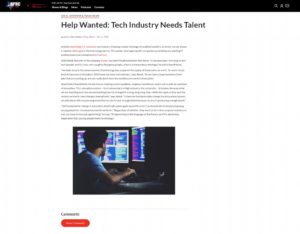 Growing up I took a natural interest in computers and technology, and I was always tinkering and trying to teach myself the basics of computer science. I was enamored by new discoveries and motivated to learn more when I realized I had a natural talent for the subject and could master things my friends could not quite grasp. I attended a small private high school, and while there were plenty of programs and extracurricular activities, one of the things I noticed was the lack of STEM (Science, Technology, Engineering and Mathematics) support. STEM skills are becoming increasingly important to businesses all over the globe so it is vital that schools and after-school programs equip today’s younger generation with these skills. Mentors are the key to filling this education gap in schools for those students like me who didn’t have direct access to STEM programs.
Growing up I took a natural interest in computers and technology, and I was always tinkering and trying to teach myself the basics of computer science. I was enamored by new discoveries and motivated to learn more when I realized I had a natural talent for the subject and could master things my friends could not quite grasp. I attended a small private high school, and while there were plenty of programs and extracurricular activities, one of the things I noticed was the lack of STEM (Science, Technology, Engineering and Mathematics) support. STEM skills are becoming increasingly important to businesses all over the globe so it is vital that schools and after-school programs equip today’s younger generation with these skills. Mentors are the key to filling this education gap in schools for those students like me who didn’t have direct access to STEM programs.
I was introduced to my current mentor, Keith Morris, when he volunteered to improve the network and Wi-Fi at my high school. He was the father of two students there and had a strong background in tech. As a result, I was able to grow and start achieving new goals, learning more about STEM. He saw my potential and started teaching me everything he knew – most kids don’t get that same chance.
According to the National Math and Science Initiative, 2014, of the 15 major study categories, engineering has the highest median earnings, yet fewer than 20 percent of students choose a STEM path. I wanted to change this statistic.
In 2015 I learned about the opportunity to serve as a “Lab Mentor” at iCode. I knew what Keith had done for me and I enjoy teaching others, sharing my same passion for STEM, so I applied. The description seemed simple enough, but I didn’t realize how much satisfaction would come from investing in others and serving as a lab mentor.
When I first met one of my students, he demonstrated his interest and talent in computer science. I sought to help develop his knowledge and pique his curiosity with new ideas. One day he decided he wanted to learn how to “hack for good,” and attempted to hack into my computer. I gave him a smile and told him to go ahead and try. Though he wasn’t successful that day, I was able to encourage his desire to learn more about a career in STEM and we still joke about the experience. He’s now even more motivated to learn about computer science and start applying his skills to everyday situations. He has even introduced me to some technological advancements, and we brainstorm ways to use knowledge to change the world.
In 2015, Forbes named Dallas as one of America’s top five cities poised to be the next Silicon Valley tech hub. If Dallas hopes to stay at the forefront of the STEM talent pool, it’s going to require mentors who are willing to step up and start investing in our youth. With January as National Mentoring Month and National Engineer’s Week just around the corner, let’s put a spotlight on STEM mentorship and start passing the torch!


